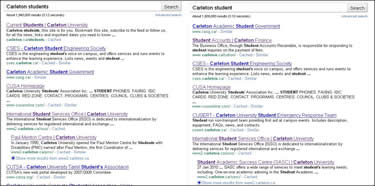Singular Versus Plural? Keyword and Tagging Vocabulary Best Practices
Today’s blog post will require you to remember your classroom grammar lessons (yea!) as we unravel the web-wide debate over which keyword metatag and post tag vocabulary forms to use to establish a consistent classification structure to help optimize your web site. A web search on tagging best practices reveals an ongoing debate over whether to use singular or plural forms. Some theorists believe that in order to fully optimize your site you must input all possible forms of a keyword or tag that a user may enter, including possible typos (for example, email, e mail, e-mail, emails, e mails, e-mails, emali, eamail, ameil, and so on). However, to avoid keyword spamming and for the sake of simplicity, we don’t advise this practice at all. Instead, we recommend being aware of your audience and using good grammar practices when planning your classification structure.
Consider your audience by creating keywords and tags that users would actually type into a search field. For instance, when users type in words and phrases in a search field, they tend to type very quickly and the quickest way to type in words is without capitalization. A combination of logic and “whatever sounds right” also comes into play for tagging best practices. For commerce sites, it makes sense that when a user is looking for a certain product to purchase, no site only sells or contains one thing so the use of plural forms would be the logical choice. For Carleton University sites, the search words users enter may concern fields of study where the singular form implies the whole. In these cases singular forms of program names such as Engineering, History, and English would be accurate.

For SEO keyword metatags, experts advise optimizing for both plural and singular forms of the keyword if possible, especially if the singular and plural form varies greatly (for example, party versus parties). Plural forms tend to get more accurate search results. For example, when entering a general search for Carleton students versus Carleton student, although the results are fairly similar, you can see that the results for the plural form returned slightly more specific results.
Here are some additional tips for controlled keyword and tagging vocabulary:
- Use unambiguous words (Master Degrees instead of Masters).
- Use the plural form for nouns except in cases where the plural form changes the meaning or is grammatically inaccurate (Education, Disciplines instead of Educations and Discipline)
- When tagging action or task-based blog topics, gerunds are better than plural nouns. (Engineering and Tagging instead of Engineer or Tag)
- A simple rule that satisfies the overall goal of natural-sounding tags is when tagging an item, simply complete the following sentence “This item is about __________.” This rule is consistent with all guidelines.
It is likely that your site classification system may suffer from the effects of over-eager bloggers riddling their posts with uncontrolled tags. Implementing a standardized approach to help clean up your tag classification system may seem like a daunting task at first but by following these simple rules and by being consistent it will add great value to your site and is worth the time commitment.